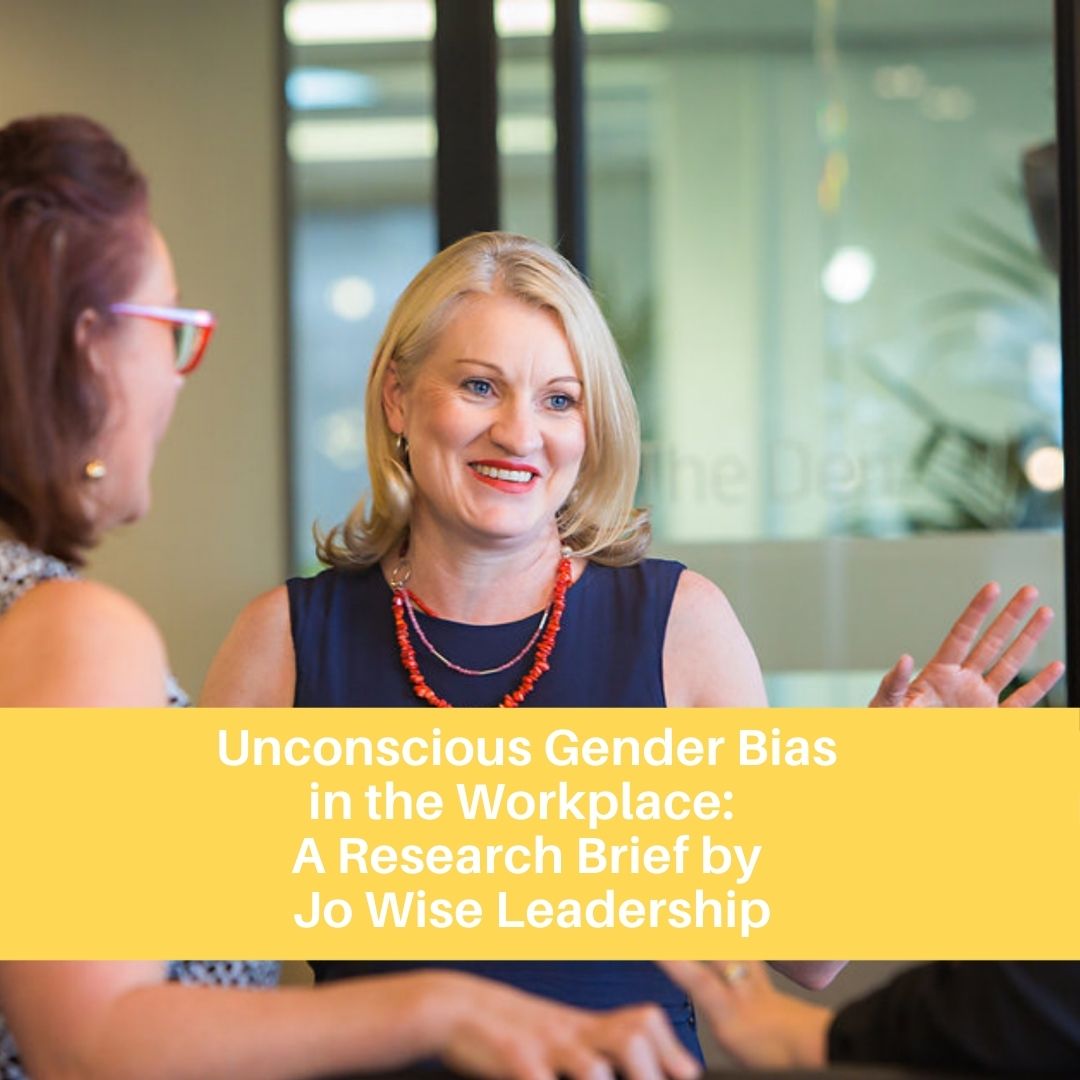
Unconscious Gender Bias in the Workplace:
A Research Brief by Jo Wise
Unconscious bias, particularly when it comes to gender, remains a pervasive force in today's workplaces, subtly undermining women's careers and creating an uneven playing field. These deeply-ingrained stereotypes and attitudes about women can influence our perceptions and actions without us even realising it, often leading to unfair treatment and missed opportunities. Understanding and addressing this issue is crucial for creating a more equitable and inclusive environment where everyone can thrive.
This white paper presents the findings of a survey conducted among 71 professional women in 2024, shedding light on the prevalence and impact of unconscious gender bias in the workplace. The survey aimed to uncover the specific challenges women face and identify potential solutions for creating a more inclusive work environment. We will explore the subtle yet damaging ways gender bias manifests, share real-life stories from women who have experienced it firsthand, and offer actionable strategies to counteract its effects.
Key Findings
Widespread Prevalence
The survey results reveal that unconscious gender bias is a widespread issue affecting a majority of women in the workplace. A significant 87.3% of respondents reported having experienced situations where they felt their gender played a role in how they were treated at work.
Common Manifestations
The survey identified several common manifestations of unconscious bias, including:
-
Being interrupted or talked over in meetings (81.7%): This reflects a lack of respect for women's voices and contributions. As one respondent shared, "Many general examples that follow the same theme of ideas I put forward in large meetings which are only taken up when male colleagues repeat them. No attribution provided to me." - Gemma
-
Having ideas dismissed or credited to a male colleague (62%): This undermines women's confidence and can hinder their career advancement. Nicola echoed this sentiment, "Ideas weren't heard. Male colleagues would say what I had just said, and it would be jumped on as a great idea."
-
Being passed over for promotions or opportunities in favour of a male colleague (62%): This suggests that bias can influence key decision-making processes, limiting women's access to leadership roles. Dani's experience illustrates this, "Yep, so many instances, but the one that annoyed me the most was when a male was employed with 0 experience in the industry as an Account Manager... only for this guy with no experience to start on day 1 on much higher pay than me. Why? Because there were too many women in the office according to my male boss!"
-
Facing microaggressions related to gender (42.3%): These subtle but harmful behaviours can create a hostile and uncomfortable work environment for women. Belinda shared her experience: "Having sexist and degrading/misogynistic comments directed at me and other women, by men. 'Women are just better at that,' 'women don’t talk about anything of substance,' 'go and make me a cup of tea, would you love?' ‘That will be too heavy for you,’ ‘a woman will end up getting pregnant and leave,’ ‘women don’t deserve as much money as men as they don’t have the same experience,’ ‘Women talk too much’."
Biggest Challenges
The top challenges identified by women due to unconscious bias were:
-
Lack of recognition and opportunities (63.4%): Women often feel their contributions are not valued or acknowledged.
-
Lower pay/compensation (62%): The gender pay gap remains a persistent issue, despite women's qualifications and experience. As Nichole succinctly put it, "Paid less than a male in the same role."
-
Difficulty advancing to leadership roles (62%): The "glass ceiling" continues to be a reality for many women, limiting their career progression. Julie's experience reflects this: "I was promoted to a senior executive position ... but I had to prove myself before I could become part of the executive team and get a seat at the table. I was the only female."
-
Feeling undervalued or disrespected (54.9%): Unconscious bias can lead to women feeling marginalised and excluded in the workplace.
Addressing the Issue
While 38% of respondents believed their workplaces had taken sufficient steps to address unconscious bias, a larger percentage (35.2%) felt that more could be done. This indicates a need for continued efforts to raise awareness and implement effective strategies to combat bias.
Only 35.2% of women reported having spoken up about experiencing or witnessing unconscious bias, highlighting the need for safer and more supportive environments where women feel comfortable addressing these issues.
Intersectionality
The survey also revealed that in addition to gender bias, many women also experienced other forms of unconscious bias, with ageism (62.1%) and caregiver bias (53.4%) being the most prevalent. This underscores the importance of recognising the intersectionality of bias and addressing the unique challenges faced by women from diverse backgrounds.
The Complexity of Unconscious Bias
The insidious nature of unconscious bias makes it particularly challenging to recognise and address. It operates below our conscious awareness, often disguised as "just the way things are," "gut feelings," or "intuition." We may genuinely believe we are being fair and objective, while our hidden biases are silently influencing our decisions and behaviours.
Furthermore, societal norms and cultural expectations often reinforce these biases, making them seem "normal" or even "natural." Women themselves may have internalised these biases, leading to self-doubt and hesitation in asserting their voices and ambitions. As Olga aptly put it in the survey, "It was blatant, so I am not sure it would be considered 'Unconscious bias.'" This highlights that sometimes these biases aren't unconscious at all; they're overt and deliberate, yet we've been conditioned to accept them as the norm.
The Toll on Women and the Workplace
These biases have a profound impact on individual women, leading to:
-
A belief in needing to overperform:
-
"There are multiple examples ... I managed to get this decision overturned, but it took a lot of my energy to make it happen." - Kristy
-
-
Eroding confidence:
-
"As a younger woman in the fashion industry, women were seen as less stable." - Summer
-
-
Suppressing strengths:
-
"The language used in my performance reviews. Can I be 'even more nurturing' and 'less intimidating'?" - Kristy
-
These factors contribute to chronic stress, burnout, and the loss of talented women from the workforce. A 2023 McKinsey & Company study revealed that companies in the top quartile for gender diversity on executive teams were 21% more likely to outperform on profitability and 27% more likely to outperform on longer-term value creation. This underscores the tangible cost of unconscious bias for businesses. My own survey further supports this, with many women sharing experiences of being interrupted or talked over in meetings (81.7%), having their ideas dismissed or credited to male colleagues (62%), and feeling undervalued or disrespected because of their gender (54.9%).
Conclusion and Recommendations
The findings of this survey underscore the urgent need to address unconscious bias in the workplace. Organisations must take proactive steps to create a more inclusive and equitable environment, including:
-
Awareness and Education: Implement comprehensive training programs to increase awareness and understanding of unconscious bias among all employees.
-
Inclusive Policies and Practices: Review and revise hiring, promotion, and performance evaluation processes to ensure fairness and objectivity.
-
Diverse Leadership: Actively promote and support the advancement of women into leadership positions.
Individuals can also play a crucial role in combating bias:
-
Self-reflection: Uncover Your Own Biases
-
Take the time to examine your own beliefs and assumptions about gender. Are there any subtle stereotypes or expectations that might be influencing your perceptions and actions?
-
Question your "gut feelings" and "intuitions" – are they based on facts or unconscious biases?
-
Seek feedback from trusted colleagues or mentors to gain a different perspective and identify potential blind spots.
-
-
Open Communication: Break the Silence
-
Initiate conversations about unconscious bias and its impact in the workplace. Create a safe space for open dialogue and encourage others to share their experiences.
-
Normalise discussions about gender equality and challenge any dismissive comments or jokes.
-
Remember, 35.2% of women in my survey felt uncomfortable speaking up about bias. Let's create an environment where everyone feels empowered to share their perspectives and concerns.
-
Advocacy and Allyship: Lift as You Climb
-
While we encourage men to become active allies in promoting gender equality, we can't solely rely on their initiative. As women, let's proactively lead the change.
-
This means actively amplifying the voices of our female colleagues, celebrating their accomplishments, and advocating for their advancement.
-
Let's create a culture of support and recognition where women feel empowered to thrive.
Furthermore, seeking support from a coach or mentor can be instrumental in navigating the complexities of unconscious bias. A coach can provide personalised guidance and strategies to:
-
Develop self-awareness and challenge internalised biases:
-
Help you identify the specific biases you may hold, even unconsciously, and understand how they might impact your decisions and interactions with others.
-
Guide you in reframing negative self-talk and challenging limiting beliefs that may stem from internalised societal expectations.
-
Provide tools and techniques to actively challenge and overcome these biases in your everyday life.
-
-
Build confidence and resilience in the face of adversity:
-
Equip you with strategies to handle setbacks and microaggressions with composure and assertiveness.
-
Develop your assertiveness skills and empower you to speak up and advocate for yourself effectively.
-
Cultivate a mindset of resilience and self-belief to overcome challenges and setbacks.
-
-
Cultivate effective communication and self-advocacy skills:
-
Help you articulate your value proposition clearly and confidently.
-
Coach you on effective negotiation strategies to ensure you receive fair compensation and opportunities.
-
Develop your presentation and communication skills to command attention and respect in any setting.
-
-
Navigate workplace challenges and microaggressions with grace and strength:
-
Provide a safe space to discuss and process experiences of bias and discrimination.
-
Equip you with practical tools and scripts to address microaggressions and inappropriate behaviour in the moment.
-
Help you develop strategies to navigate difficult conversations and advocate for yourself and others.
-
By working with a coach, female leaders can gain the support, and skills needed to overcome the challenges posed by unconscious bias, build their confidence, and thrive in their leadership careers.
Remember, the journey towards a bias-free workplace starts with each of us. By recognising our biases, fostering open dialogue, championing change, and seeking support when needed, we can break down the barriers and empower women to thrive.
For more information about the 2024 Unconscious Gender Bias Survey conducted by Jo Wise Leadership, please contact jo@jowiseleadership.com.
References
Budig, M. J. (2010). The motherhood penalty and the fatherhood bonus: A review of the contemporary literature. Community, Work & Family, 13(2), 193-214.
Diversity Council Australia, (2022). Workforce inclusion in Australia: The state of play 2022.
McKinsey & Company, (2023). Diversity wins: How inclusion matters.
Williams, J.C., & Dempsey, R. (2014). What Works for Women at Work: Four Patterns Working Women Need to Know.
Wise, J. (2024). Unconscious Gender Bias Survey.
Share this post on:

ABOUT THE AUTHOR
JO WISE
Master Certified Coach with the ICF who is dedicated to elevating female leaders to new heights. A woman who lives life boldly, loves adventure, and finds joy in the simple things. She's a surfer, gardener, hiker, partner, and proud mum of one teen and 3 chickens.
What Now
Elevate your leadership with my three-part video training series exclusively for female leaders. Gain motivation, break free from repetitive cycles, and embrace bold leadership. Enter your name and email below for instant access. Let's unlock your leadership potential together!

© Copyrights 2023. Jo Wise Leadership. All Rights Reseved.